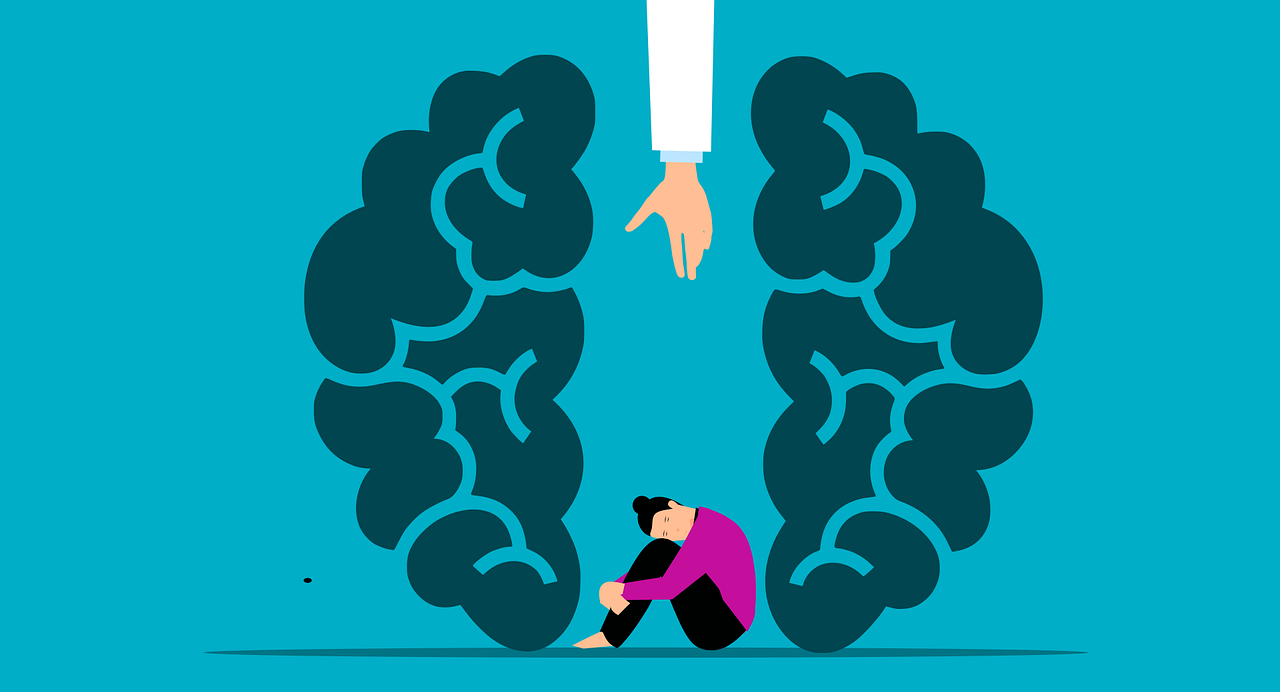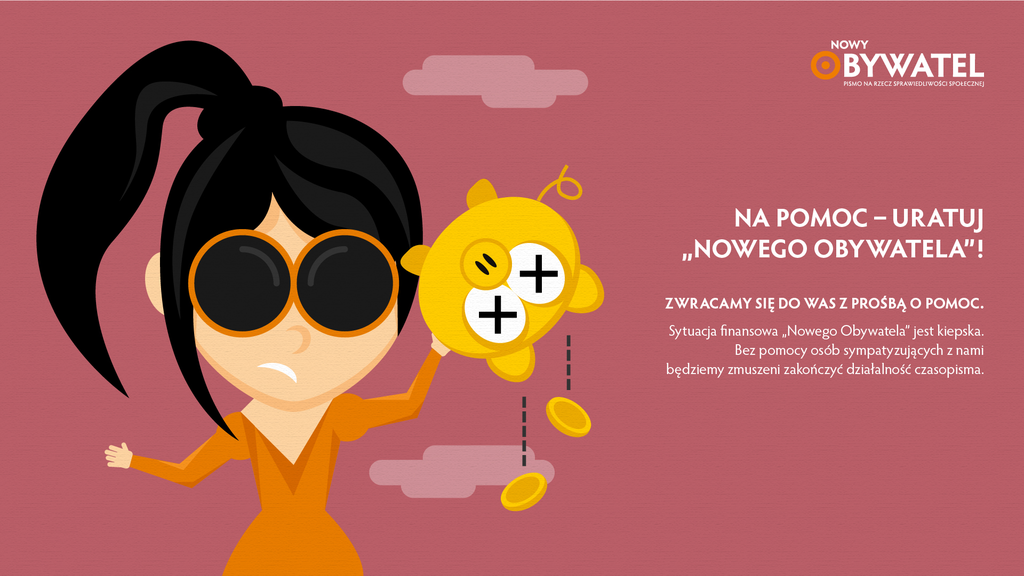Unliveable system
Unliveable system
Reading Gabor Maté and his son Daniel’s book 'The Myth of Normal. Trauma, Illness and Recovery in a Toxic Culture’ is an expedition both towards the inner self and the world we live in. I am not exaggerating, although it may be perceived as such, when I say that I found the book, both an intellectual and a transcendental experience. Is it an easy read? No. The book touches on the deepest individual and social traumas and the resulting illnesses, inequalities, racism, oppression of every kind imaginable. However, Maté, like a good doctor, gives the reader an anaesthetic. In one drip we get the best and most precious thing one human being can give to another. Great empathy, sensitivity and warmth and the support that flows from them.
The inelegant 'C’ word
I recently attended a large economic congress. It opened with a speech by an activist working in numerous organizations on climate change, refugee issues and economic inequality. Her speech was very emotional. The poor woman was almost tearing her hair out. The premise of the speech was: „I don’t know”. She expressed her fear and despair very expressively, while talking about the liberating sense of admitting her own not knowing. This last one was about solutions to the problems currently plaguing entire communities and individuals around the world. While rhetorically it was a very skilful performance, and an overall successful speech, there was something missing for me. I understand that one may not know what to do next. But, let’s face it, dealing on so many fronts, it is impossible not to know and say what is causing these phenomena.
With eyes wide open, and with a sense of amazement, I watched the speaker exercise to speak, rather than to say She said things like: „We need to revise economic influences on society” and other similar stunts that no champion skater would be ashamed of. These triple toe-loops were probably required in order not to call the economic system by its name – capitalism.
By failing to be concrete and point out what, in the light of research by academics in virtually every field, is an indisputable fact, I got the impression that this activist had been invited in as a 'token social worker’. A person who will talk, talk, talk and then let’s get down to the serious stuff. Such as how to generate more growth. Business as usual. We’ll distribute grants, sit down in our chairs, pat each other on the back and be done with it.
The event brought me to reflect on a kind of taboo when it comes to talking about capitalism.
I’ve noticed more than once that the mere mention of the name immediately invites censure and the atmosphere becomes somewhat awkwardeven if said in a neutral context. In such situations, the reactions of those around me include „What’s wrong with you again?”, „What are you always picking on?” Even if I’m not picking on anything.
I think that such a linguistic taboo serves to reinforce the conviction that there is no alternative to the system. It presents the system not as a human construct that it is, but as some arbitrary – even a natural reality – that is impossible to change.
Capitalism, then, is a bit like He Who Must Not Be Named from the Harry Potter novels. What does the book in question have to do with this? It is the fact that Gabor Maté is not afraid to speak the name of the Dark Lord. And let’s not scare our hearts out! Let us note that in the novels, the pronounce of Voldemort’s name was avoided so as not to evoke him. Therefore, I believe that we are, in our unfortunate position, safe. For he has been here for a long time. He is the water in which we swim, to use a natural metaphor. So there is not the slightest reason to fear his arrival. The battle for Hogwarts, however, is still ongoing. And Gabor and Daniel Maté’s book can provide a valuable weapon.
I will conclude this lengthy introduction with a quote from the eminent writer Ursula K. Le Guin, which is worth recalling in moments of general doubt: „We live in capitalism. Its power seems inevitable to us. But so did the divine right of kings. Every human power, however, can be repelled and changed by human beings”.
Into the essence of things
I must admit that I have never faced such a huge challenge when it comes to writing. Firstly, because the book has impressed me so much that I would most like to quote it word for word, which would be an obvious violation of copyright, and then you wouldn’t reach for it, and you wouldn’t buy it. Secondly, because it is over 500 pages long. The number of issues goes into tens, the studies and interviews cited into hundreds. Therefore, willingly or unwillingly (with emphasis on the latter), I will limit myself to a broader discussion of only two – subjectively selected by me – issues appearing on the pages of the book. These will be mental illness and a different understanding of so-called human nature from the mainstream.
Maté paints a complete and coherent picture. He first looks at the concept, which he places at the centre of his reflections, as the source of human suffering in its various forms and guises. For him, this is trauma. He explains it briefly as an intra-psychic break-up, a tearing of the soul into pieces. He then goes on to look at what contributes to trauma, at each stage of human development and how it relates to a system that creates enormous pressure, not only economically, but also related to insecurity, the oppression caused by patriarchy, classism and racism, the breakdown of social bonds, the alienation of the human beings and the commercialisation of every sphere of life. He analyses this first at the level of individuals, moving later to the general level, to political life, media, advertising, and corporations. In the last part of the book, he proposes his solutions and the paths towards both individual and social healing.
When I think of the guiding principle by which this book is 'made’, Stoic thought and Marcus Aurelius’ 'Meditations’ come to mind. A common feature of the description of all the phenomena, from traumas and illnesses to addictions to social problems, so many of which are mentioned in the book, is the desire to see their essence. The deepest source of their origins and their nature and how they relate to the human being, the family, society, the system. The perspicacity and precision with which Maté sheds light on each phenomenon he describes is intimidating. Everything is backed up by a great deal of professional literature, but also by examples drawn from his clinical practice—the statements of people struggling with a particular problem.
The greatest strength of this book is to show that most of the difficulties we experience are not at all a 'private’ matter, let alone a matter of private responsibility for each of us. It is the result of living in a toxic culture that is hard on us. And it is also the fact that the human being – his body and mind – are not disconnected from each other, but are a whole, and illness and recovery should be thought of as such. The whole world, meanwhile, is a system of interconnected vessels that also constantly interact.
It is working for them!
What did the author mean when he titled his book 'The Myth of Normal’? In my opinion, 'The Myth of Normal’ means that an attempt is made to explain most of the conditions (diseases and disorders) that afflict people, as well as most of the social problems (addictions, poverty, racism) as usual under capitalism. Since these are costs, not profits, they have to be passed on to the people who experience them: their genetics, the imbalance of substances in their brains, the weakness of their characters, whatever. And then wash one’s hands off it and say: 'Apart from this – independent of us X, Y, Z – everything is normal’. It works for us! This is what the luminaries of the free market, the billionaires and politicians say here, and even the doctors, who are also severely criticized in the book.
Meanwhile, these problems are socially conditioned. What’s more, they are a cry, a dramatic cry of despair that should set off all the red warning lights. The system is not working. Or perhaps, correcting this statement, it is working according in accordance with its designs. That is, it is generating growth on economic indicators. The cost, however, is appalling, leading to great suffering for people and the planet as a whole.
A statement by the philosopher and environmentalist, Edward Abbey, comes to mind, who said: „Growth for growth’s sake is the ideology of the cancer cell”. And indeed, this self-propelled machine of greed is the antithesis of humanity and is precisely why it leads to complications such as disease, addiction, environmental devastation, etc., wreaking general havoc.
Are we evil by nature? Naturally not!
Human nature. Apologists of capitalism and the free market very readily and often argue that human beings are by nature greedy, selfish, oriented primarily towards their own individual benefit. This puts the system in a very comfortable position, because it promotes, not to say forces, just such behaviour. To hog the limelight, to „laugh all the way to the bank”, as my mother used to say when answering the question of why people go into politics.
Are we really by nature loners, hostile to other members of our species? I have never thought so. I know it is a downfall of humanity to tell or describe memes, but I hope I will be forgiven. There is a meme from the Star Wars universe. It depicts the ghost of Anakin Skywalker appearing to Kylo Ren. Ren says: greed is human nature. Anakin replies, correcting the padawan: When you see an elephant juggling in a circus, do you assume that juggling is the nature of an elephant?
Maté is cautious about formulating revealed truths or definitions of the nature of man because, as he rightly points out, it is too complex a matter to be so narrowly defined. As in many other cases, he believes it is a spectrum with boundaries that are difficult to draw. However, he says one thing very emphatically: we are not by nature evil. We are only conditioned.
I remembered this: if all the time in which our species has existed were to be represented by one hour, then the time we live in one civilization or another would be six minutes. What follows from this? The answer to the question of what our nature is will not be found by looking at our behaviour today, 100 or 1,000 years ago. Maté goes back to the hunter-gatherer community in which we lived for 54 minutes out of an hour. And he discovers that all the research on these communities and their habits tells us that these were groups in which concern, care and support were overriding values over individual benefit. Humans would not survive on their own. A similar hierarchy of values prevailed in the indigenous communities, the tribes, which we have so persistently and not at all secretly 'civilized’ at known cost and by known means.
“Silly girl, listen!” But she doesn’t listen.
Methinks, I see… Where?
— In my mind’s eyes.
This quote from 'Hamlet’ is the motto of 'Romanticism’ by Adam Mickiewicz. The poem describes a heroine who experiences hallucinations and delusions, which modern medicine would probably diagnose as one of the many varieties of psychosis. Gabor Maté devotes relatively little space to this group of diagnoses, if one looks at the number of pages devoted in the book to describing, for example, depression. However, he presents a very clear and comprehensive approach. Psychoses are the most severe and least understood disorders in terms of their aetiology out of a whole, very long, list of psychiatric diagnoses. By contrast, as Maté coruscatingly calls it, 'so-called schizophrenia’ is sometimes referred to as 'the queen of all mental illnesses’— what an honourable title!
The description of just such health problems is worth noting. Problems that we do not understand, whose manifestations we fear and whose causes we do not know, or at any rate do not fully know. Maté’s position, by the way, is that we do not know the biological cause of ANY mental disorder, and that diagnoses only serve doctors to describe the set of symptoms contained under a given label. He explains this quite amusingly using the example of bipolar affective disorder. How do we know, he writes, that someone has ChAD? Because he has mood swings. And why does she have mood swings? Because he has ChAD.
As Maté persuades us, no gene responsible for mental illness has ever been discovered. At most, there are large sets of genes that are responsible for a certain susceptibility, but do not determine anything. How, on the other hand, does Gabor Maté see the sources of the problem? He sees them mainly in environmental factors. In the trauma experienced. Experiences such as neglect, abuse, addictions in the family home, parentification, i.e. a situation in which the child takes on a protective role in relation to the parents, sexual –abuse. These are serious determinants not only of psychosis, but of all illnesses, and not only those affecting the mind, but also cancers and autoimmune diseases, for example. According to the author the more we are bruised, the more strongly it resonates in us. Therefore, the more severe the wounds, the more serious are the disorders later on. He cites relevant scientific studies that prove this, but even if he didn’t, I would still recognize a profound sense in this.
Maté also notes that, as a society, we are unwilling to acknowledge this explanation, despite the intuition and research findings supporting its veracity. A simple mechanism is at work here. We would then have to admit that our toxic culture and our society produce conditions in which – in a very literal sense – one can go mad. It is a burden of shame that we do not want and from which we defend ourselves.
Furthermore, the author explains that, although the behaviour of people in psychotic crisis makes no sense, already on an emotional and symbolic level the delusions these people experience are always rooted in their biography. Read from this perspective, such behaviour can be explained and even become logical and are then the key to recovery and even healing. This is a profoundly humanistic approach, which I associate with the poem with which this part of the text begins. I have the impression that for Gabor Maté, scientist and physician, the term 'healer’ would be more appropriate. Because he sometimes gives expression to the fact that it is „feeling and faith that speak more strongly to him than the sage glass and eye”. Or, in any case, that he favours a combination of both perspectives on equal terms.
Hope as old as time
The remedy that Dr Maté proposes may come as a disappointment to many. For it is not a worldwide anti-capitalist revolution. At least not the kind we usually imagine it (if we do, of course), but something much less spectacular.
Maté offers us introspection and insight into ourselves. To treat trauma or its effect – illness – as something that is not an external bolt from the blue, but something that happens to us as a result of our experiences. And also, importantly, something that harbours the potential to heal us and to develop us to reach the fullness of humanity.
And to the overwhelming forces oppressing us from the outside, he proposes to foster relationships, close bonds of love, friendship, solidarity and cooperation. Compassion for oneself and for others, the development of empathy. In essence, Maté is advocating a return, not literally of course, but at the level of values, to the communities we created before we became so brilliant and civilized. That is, to put a premium on bonds, caring for each other and giving each other support, rather than trashing each other in a rush to nowhere.
So much for that? So much, in fact. But I wouldn’t say just that.
Natalia Bała

 Patronite
Patronite

